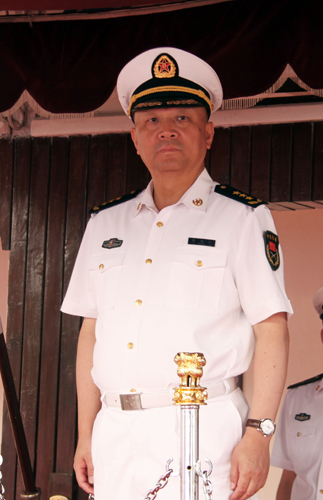Large surface combat ships, supersonic cruise aircraft, high-speed intelligent torpedoes... These are a few sophisticated marine weapons China plans to build.
 |
|
Wu Shengli
|
"The Navy will move faster in researching and building new-generation weapons to boost the ability to fight in regional sea wars under the circumstance of information technology," Navy Commander Admiral Wu Shengli told Xinhua in an exclusive interview -- one week ahead of the 60th anniversary of the founding of the People's Liberation Army Navy.
In addition to ships, aircraft and torpedoes, long-range missiles with high accuracy, submarines with superb invisibility and endurance and electronic weapons and facilities are also on the Navy's agenda.
He said the Navy would have more equipment for offshore repair, high-seas dispatch, large-scale rescue and supply among others.
According to Wu, the Navy will incorporate the capacity for non-war military actions to the integrated construction of the army's power, especially emergency offshore search and rescue and anti-terrorism activities.
Since 2003, President Hu Jintao has repeatedly inspected the country's Navy and made suggestions on its construction.
"The navy force should be strengthened and modernized under the guidance of the Deng Xiaoping Theory and the 'Three Represents' to serve the country and its people more effectively," said Hu when meeting with representatives of the navy's 10th Party congress on Dec. 27, 2006.
China has huge strategic benefits in sea areas and current threats to our country's security come mostly from the seas, said Hu, who is also chairman of the Central Military Commission.
Hu urged the Navy to achieve sound and fast development and enhance the defensive operations with information technology.
Admiral Wu Shengli said regrouping the army system, optimizing army structure and distribution in battlefields were among the issues for more discussion during the new round of the Navy construction.
In 2009, the Chinese Navy would continue its missions in the Gulf of Aden and waters off the Somali coast to protect merchant vessels against spreading piracy.
The Gulf of Aden is one of the world's busiest shipping routes, which about 1,000 Chinese vessels pass through each year.
Previous reports said more than 40 naval vessels will join a grand international fleet around April 23 in a display to mark the 60th anniversary of the founding of the PLA Navy.
The navies of 15 countries have pledged to send ships to the east port city of Qingdao as part of the celebrations and at least 28 foreign countries will send delegations, said the officer with the Navy's headquarters.
The officer said the celebrations will be an opportunity for foreign navies to have intensive and close observation of the PLA Navy's facilities and personnel.